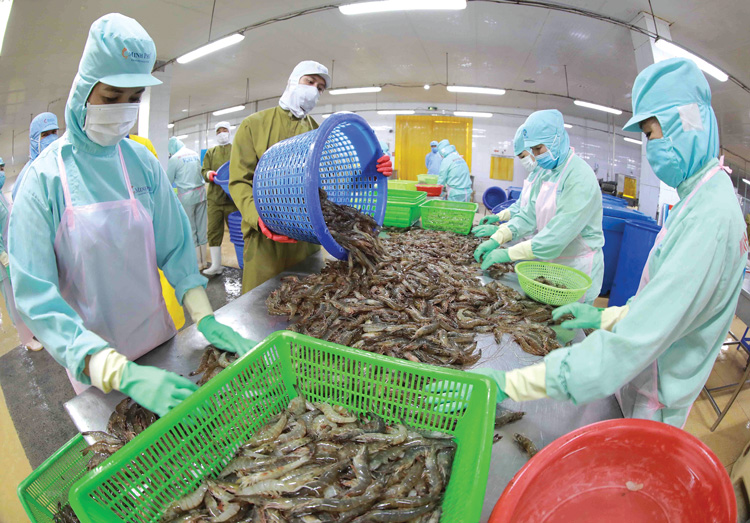Exporting to the UK market: Strategies and how to find information
After more than 3 years of implementation, the positive results that the UKVFTA has brought to trade and investment activities between the Vietnamese and UK business communities have been clearly affirmed. In particular, in the context of Vietnam's trade exchange with most key export markets declining due to geopolitical tensions and general difficulties of the global economy, two-way trade between Vietnam and the UK is a bright spot.

Currently, shrimp accounts for 70% of the total export turnover of Vietnamese seafood to the UK.
Important impacts on trade and investment cooperation between Vietnam and the UK
The UKVFTA has become a bridge to bring Vietnam's strong goods to the UK market, helping to increase bilateral trade turnover. In particular, it is noted that the presence of Vietnamese brands varies by product group, reaching from 12% - 19%. The main export items are textiles, footwear, mechanical products, and aquatic products, of which textiles, footwear, agricultural and aquatic products benefit the most.
With the tariff reduction roadmap of the UKVFTA, Vietnamese goods are gradually gaining a distinct advantage over similar products from other countries that do not have an FTA with the UK.
At the seminar “Exporting to the UK market: Strategies and ways to find information” organized by Industry and Trade Magazine, Mr. Vu Viet Thanh - representative of the European - American Market Department - said that since 2021, the UKVFTA Agreement has come into effect and has become an extremely important driving force, promoting this economic, trade and investment cooperation relationship to a new level. There are 5 important impacts related to trade and investment cooperation between the two sides.
The first impact is that Vietnam's export sector to the UK benefits greatly from the UKVFTA.
According to Mr. Thanh, after more than 3 years of implementing the agreement, Vietnam's exports to the UK have grown continuously and steadily. However, there have also been very difficult periods for Vietnam's exports to the world, for example during the Covid-19 period or the end of 2023. At the end of 2023, it can be seen that Vietnam's exports to most key markets in the European region have decreased unprecedentedly, all at double-digit rates. However, Vietnam's exports to the UK have maintained a stable growth momentum.
“ If calculated over the 3 years of implementing the UKVFTA, the total two-way trade turnover between the two countries increased by an average of 8.9% per year, in which Vietnam's exports to the UK increased by an average of 9.4% per year, ” Mr. Thanh commented, assessing that this is a much higher growth rate than the general growth rate of Vietnam's exports.
On the other hand, the UKVFTA with its comprehensive tariff removal orders also contributes significantly to increasing the market share of some of Vietnam's strong product groups in the UK market.
According to data compiled from ITC's Trade Map, there are currently a number of important Vietnamese export products that are leading the UK market segment. For example, pepper, shelled cashew nuts, footwear, coffee; seafood is in 5th place and garment is in 6th place. In 2023, with the efforts of many domestic relevant agencies, a number of Vietnamese agricultural products have been officially exported to the UK market, for example, some types of fruits, oranges, tangerines, grapefruit, lychees, durian.
Along with that, we also persistently worked with great efforts of the Vietnam Trade Office in the UK, helping Vietnamese dragon fruit products continue to circulate normally in the market.
The second impact is that the UKVFTA helps increase the export of some UK products to Vietnam. Specifically, products with very high scientific and technological content as well as high-quality input materials serving the country's industrialization and modernization, such as machinery, automobiles, basic chemicals, medical products, and pharmaceuticals.
Third, in terms of investment, it can be seen that the impact of UK investment capital in Vietnam in the recent period has clearly improved.
In general, in terms of attracting FDI into Vietnam over the past 3 years, the UK is a bright spot with very positive growth in investment projects. Over the past 3 years, the total number of UK registered projects in Vietnam has increased by more than 1.5 times from 380 projects at the end of 2020 to 584 projects after the first 9 months of 2024 with a total capital of 4.5 billion USD. UK investment projects in Vietnam are spread across many important fields from processing and manufacturing industry, financial services, banking, renewable energy, healthcare, pharmaceuticals, etc.
The fourth impact is the positive impact on the institutional side. According to Mr. Thanh, the UKVFTA helps Vietnam reform its institutions in many areas of trade, investment and sustainable development, public procurement, commercial services, etc. This creates development space and a solid legal foundation for the future development of the two countries.
The fifth impact, which is also an important impact, is from the business perspective. Currently, Vietnamese businesses have made good use of the tariff incentives from the UKVFTA.
Mr. Thanh said that the rate of utilizing preferential C/O according to the form of this Agreement is currently at over 30%, meaning that the growth has been gradually stable over the years, as well as a significant number of Vietnamese enterprises have matured a lot in accessing the market, bringing Vietnamese goods to the UK market, meeting increasingly high standards of green consumption, sustainable development, enhancing the responsibility of producers as well as participating in the supply chain, thereby being able to take advantage of the long-term benefits of this Agreement in the coming time.
As one of Vietnam's key export industries to the UK and also one of the products that enjoy preferential tariffs when the UKVFTA comes into effect, Mr. Nguyen Hoai Nam, Deputy General Secretary, Vietnam Association of Seafood Exporters and Producers (VASEP) - shared that the advantage that the FTA brings is that as soon as the Agreement between Vietnam and the UK comes into effect, the main products of our industry have import taxes transferred to 0% immediately, such as shrimp and pangasius. Currently, shrimp accounts for 70% of the total export turnover of Vietnamese seafood to the UK, followed by pangasius, accounting for 20%.
“ These two key products have accounted for 90% of the total average export turnover in the past three years, about 300 - 350 million USD a year, which is about 4% of the total export turnover of Vietnamese seafood globally,” Mr. Nam added.

Need a strategy and a way to find market information
Sharing about Vietnamese enterprises' access to market information, Mr. Nguyen Canh Cuong - Former Counselor of the Embassy in the UK - said that Vietnamese enterprises are increasingly dynamic, especially young enterprises, with new skills in digital technology, marketing on digital-based platforms, helping to find information faster and more than traditional methods. However, not all enterprises have achieved the same level and efficiency as those that have grown exports to the UK. Many enterprises have not proactively researched and sought market information, including the most basic information. Some Vietnamese enterprises have good products but do not have a method to approach the market.
“Vietnamese businesses are still limited in searching for and analyzing information. Meanwhile, free information sources about British businesses are available on companieshouse.gov.uk ” - Mr. Nguyen Canh Cuong pointed out and added that he had witnessed Vietnamese businesses working with a partner for ten years "going smoothly". When trusting a friend to deliver goods first and pay later, but the partner is about to go bankrupt, the business puts itself in a very high-risk situation.
Therefore, according to Mr. Cuong, we should not take lightly the matter of checking the financial status of partners, including traditional partners.
On the part of the state management agency, Mr. Vu Viet Thanh, Department of European - American Markets (Ministry of Industry and Trade) also recommended that Vietnamese enterprises exporting to the UK need to carefully look up information about the market, enterprises, and partners to avoid being scammed or cheated.
On the other hand, businesses need to strictly control the entire production process, ensure traceability, food hygiene and safety quality, etc.; clearly identify market segments; conduct in-depth research on market tastes and trends.
Thuy Linh


